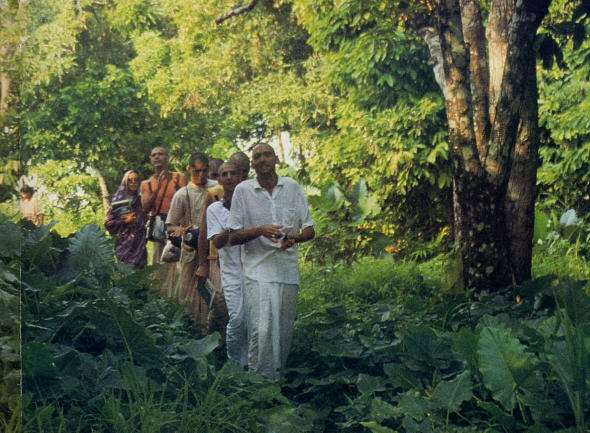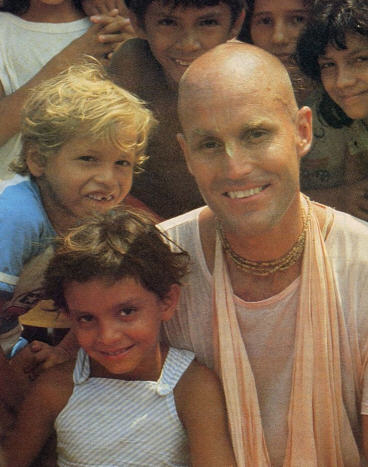As the weeks went by, they came to respect the jungle that was their home. Despite the many hazards and austerities it imposed on them, it was God’s creation, undisturbed by man.
A New Frontier For Lord Caitanya’s Mercy
One day late last fall, one of my Godbrothers requested me to travel and preach Krsna consciousness in Brazil. I jumped at the opportunity. As a sannyasi I am duty-bound to travel widely and teach within our Hare Krsna Society, and I knew we had many centers in Brazil. Yet as I looked over a map, I realized that my Godbrother’s request opened up another opportunity: I would have a chance to take the Hare Krsna movement to a new frontier the Amazon jungle.

Krsna Holy Name To The Amazon Jungle
In the early years of our Society I had the privilege to help pioneer the spreading of Krsna consciousness in Europe. Since those days the movement has expanded to every continent in its effort to fulfill the prediction made five hundred years ago by Lord Caitanya Mahaprabhu that the chanting of Hare Krsna would one day go to every town and village in the world. Yet there still remain some places untouched by the sankirtanamovement, and I longed for the pioneering experience again. In my Godbrother’s invitation I had found my chance.
Starting in Rio de Janeiro, I traveled north through Salvador, Recife, and Belem. After some weeks my dream of bringing Krsna consciousness to the Amazon came closer to becoming a reality, when the small plane I was flying in landed in Manaus, deep in the Amazon jungle. As the pilot brought the plane to a halt and opened the door, I was met by a wave of the heat and humidity that would be my constant companions for the months ahead.
As I collected my bags, I was happy to see the small group of devotees who had come to pick me up. They had opened a small temple in Manaus two years before and since then had not seen another devotee. Their responsibilities had not taken them far beyond the city limits, but when I revealed my plan to take Krsna consciousness up the Amazon River, they immediately responded with enthusiastic smiles.
Despite their enthusiasm, however, I soon learned that there were practical problems to be solved before my plan could be fulfilled. ISKCON Manaus was a poor center ten devotees in a small apartment and with no car, what to speak of a suitable boat for plying up the Amazon. But I had faith that if Lord Caitanya wanted our trip, it would happen.
And sure enough, that weekend at the Sunday Feast Krsna fulfilled our desire, as we were honored to receive the wife of the governor of Amazon state, Mrs. Tarcila Mendez. A regular visitor to the small center, she responded enthusiastically to my idea. I asked her to help us find a boat with which we could travel up the river. This was the only mode of transport suitable for visiting the villages in the jungle, many of which have no roads connecting them to the civilized world.
Two days later Mrs. Mendez returned to the Manaus temple. She had discussed our proposed expedition with her husband, and they had decided to let us use their own riverboat, the Piraiba, especially suited to the dangerous conditions of the Amazon.
I was overwhelmed by her generosity, and even more so when I visited the boat with her the next day. Lord Krsna had inspired her to load the one-hundred-ton, eighty-five-foot boat with a two-month supply of foodstuffs, including half a ton of grain for prasadam distribution, and a supply of fresh drinking water for the entire journey. And what’s more, her husband had ordered the military to provide a crew of six: a captain, a first lieutenant, an engine man, and three crew members. He also offered to pay for the fuel for the entire trip. And to my ultimate surprise, he ordered the whole crew to be vegetarian for the entire journey!
Taking these facilities as a direct sign from Lord Caitanya, we loaded the Piraiba with Srila Prabhupada’s books and other supplies and, flying the Brazilian flag, left port that day bound for Tefe, more than six hundred miles away. As we left Manaus and with it civilization we looked forward to the adventure of preaching Krsna consciousness for the first time in the villages that lay ahead.
But we knew that even with the facilities we had, the voyage was not without risks. The first day out, the captain warned us about falling overboard: the piranhas would devour anyone in minutes. And there were thepiraibas after whom the boat was named large flesh-eating fish that could swallow a man whole. The river itself was constantly changing course and had dangerous whirlpools that could easily capsize our boat. And there were the pervasive mosquitoes carrying malaria and dengue and yellow fever. I soon learned, too, that the alligators and snakes were not in cages out here. This wasn’t a trip into Adventure land at Disney World.
After a few days we reached the first village along the river’s bank We anchored, boarded our small lifeboat, and headed for shore, armed only with Krsna’s holy names, prasadam, and Srila Prabhupada’s books. Knowing that the villagers rarely see visitors, we couldn’t predict their reactions when fifteen Hare Krsna devotees would come chanting and dancing into their village.
But our apprehensions were soon pleasantly relieved when we saw several hundred men, women, and children lining the shore for our arrival. After following us up the riverbank, they continued with us the entire two hours as we wound our way through the village’s small dirt streets chanting Hare Krsna. Everyone was hungry by the time we stopped to distribute prasadam. They ate heartily and then listened intently as I spoke, through a translator, on the philosophy of Bhagavad-gita.
It was dark before we left. Pushing our lifeboat off from the shore, I smiled to think that the sankirtana movement was just as popular here in the wild Amazon jungle as it is anywhere else in the world.

We were soon reminded of the perils of the jungle, however. Unable to find our way back to the Piraiba, we wandered aimlessly for hours alongside the bank of the river. Suddenly we found ourselves in an eerie swamp, lit only by the dim lights of thousands of fireflies. Then, in our efforts to get out, we got stuck on a sand bar . . . or so we thought.
As I stepped out of the lifeboat to free our craft, my leg was suddenly sucked under quicksand! I pushed the boat desperately to free myself. Fortunately, the devotees were able to grab me, and we broke free. Once safely inside the boat, my small flashlight lit up the eyes of an alligator just a few yards away. Within an hour we had found our way back to the Piraiba and the security it offered in the middle of the wilderness.
On our third day up the river we came upon our second village. Here we didn’t have time to guess about our reception. As soon as we came within sight of the group of thatched huts and small wooden houses, a dozen boats from the village came out to meet us. News of our last stop had spread, and the people had come for food and medicine. Having barely enough medicine for ourselves, we distributed prasadam overboard into eager hands.
As the weeks went by, we came to respect the mighty jungle that was our home. Despite the many hazards and austerities it imposed on us, it was God’s creation, undisturbed by man. As wild as it was, it seemed perfectly orchestrated by Him. Each morning as the sun rose, its orange rays beautifully contrasted with the deep green of the jungle and set a majestic backdrop for the activities of the jungle’s millions of inhabitants. Our morning classes on the bank of the river were often visited by curious onlookers: chattering monkeys, colorful parrots, wild boars and buffalos. Once, a leopard studied us momentarily from a distance. Strangely enough, we often felt at home so far from civilization.
Winding our way up the river, we would visit three or four villages a day, some with as few as twenty inhabitants. Several times the village leaders came back to our boat for a vegetarian dinner and an evening of philosophical discussion. And we would always present them with a copy of Srila Prabhupada’s Bhagavad-gita As It Is, ensuring that the timeless wisdom of Lord Krsna would remain behind even as we continued on our way.
One night, halfway through the journey, disaster almost struck again. Plying silently through the water while we were fast asleep, our boat hit a sandbar concealed just below the surface. Everything lurched forward, and the boat began to tip to one side. We called out to Lord Krsna for help. In the darkness it was difficult to perceive our actual position, but I knew that the river would be merciless if we capsized. Suddenly, by Krsna’s grace the swift current freed us, and we drifted off the sandbar to safety.
After one month we reached our destination, Tefe. As we pulled into port, we looked forward to some of the amenities of civilization we knew could be found here in this larger town, connected to the rest of the world by a small airport. Sewing needles, bandages, sun protection cream, and dysentery pills were the first order of business.
As we prepared for our return trip, I realized that I didn’t regret the risks and austerities we’d undergone. We had enjoyed the privilege and satisfaction of taking Lord Caitanya’s sankirtana movement to this jungle for the first time. Even as we began our voyage down the river and back home, I took out my map and pondered once again were there any other regions left in which to pioneer the mercy of Lord Sri Caitanya Mahaprabhu?
To know more about Indradyumna Swami, visit www.indradyumnaswami.com
